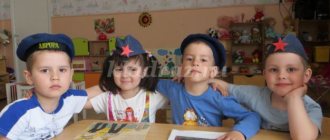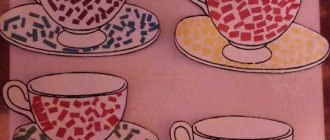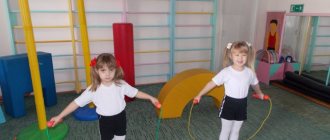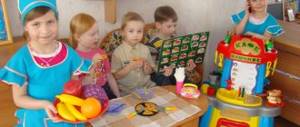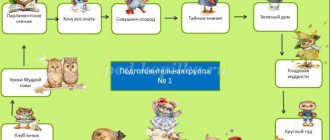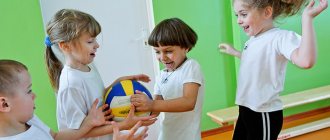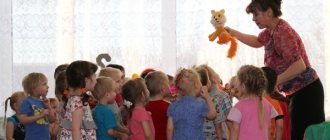Project for children of the senior group of preschool educational institutions. Topic: Professions
Project for children of senior preschool age. Our parents' professions
Author: Lebedeva Olga Gennadievna, teacher at GBOU school 2121 named after. Marshal of the Soviet Union S.K. Kurkotkina, House of Culture No. 1 “Planet of Childhood”. Description of the material: This project is aimed at familiarizing preschoolers with the professional activities of adults, with the professions of people in their immediate environment. The material is intended for preschool teachers, as well as parents interested in the upbringing and education of their children. The work uses slides of a presentation made for a performance at the school project festival “Smart Owl”.
Project goal: Formation of students’ ideas about the professional activities of adults, about the importance of work in everyday life for each of us. Project objectives: Cognitive development
– • create conditions for increasing students’ interest in their parents’ professions;
• form initial ideas about the professions of parents; • help determine and understand the significance of the professional activities of adults; • broaden the horizons of pupils; • promote the development of cognitive interest, attention, memory, thinking. Speech development
– • enrich the pupils’ vocabulary by introducing new words (“profession”, “professional”, “hard work”, “idler”, etc.) and expressions (sayings, proverbs);
• teach students to maintain a conversation (conduct a dialogue), answer questions asked, and draw conclusions; • develop coherent speech, the ability to speak out on a topic. Social and communicative development
– • contribute to the enrichment of parent-child relationships;
• involve parents of students in cognitive and creative activities together with children and teachers; • enrich the experience of communication between peers; • cultivate pride and respect for the work of parents and the work of other adults. Artistic and aesthetic development
– • familiarize students with works of fiction on the topic of the project; • learn proverbs and sayings about work and laziness, help understand their meaning; • learn the poem by K. Galaktionova “There are many professions in the world”; • develop the desire to reflect their knowledge and impressions about the work of adults in everyday play activities.
Project type: overview, introductory, informational and educational, open-ended (initial stage); Duration of the initial stage of the project: 2 weeks; Type of project: group; Project participants: senior group students, teachers, parents of students; Children's age: 5-6 years; Problems of the project: Insufficient, superficial knowledge and ideas of students on the topic of the project due to their age characteristics. Relevance of the project: Choosing a profession is a very complex and significant process in the life of any person, which one day each of our students will have to do when the time comes. And the sooner we begin to introduce them to the “world of professions”, the sooner we begin to talk about the importance of work, about its benefits for the whole society, the easier it will be for a teenager to make this difficult choice in due time, on which his socialization and success in life will depend. complex, constantly changing and developing world. Therefore, it is impossible to determine the timing of the project. This stage is an overview, it is of an informational, informational and educational nature and will help children become interested in “the world of professions - the world of adults and their parents.”
The novelty of the project: early career guidance for children. Interaction with the families of the pupils: • recommend that the parents of the pupils talk about their profession, its significance and value for the life of society in a form accessible to children;
• involve them in joint productive and creative activities to produce a “Card Index of Professions”; • recommend watching animated films with children: “A Tale of Laziness” (Soyuzmultfilm 1976), “Oh and Ah” (Soyuzmultfilm 1975), “That’ll do” (Soyuzmultfilm 1981) directed by Yu. Prytkov; • recommend that parents of pupils take their children on targeted walks, excursions to their place of work (as available), to places of professional activity of people in professions familiar to their children (library, post office, cafe, store, etc.). Project implementation
Stage I
– preparatory • study of material on the project topic;
• justification of its relevance and issues; • determination of goals and objectives, deadlines for implementation; • selection of methodological material necessary for the implementation of the project; • decorating the book center with children's literature and illustrations on the theme of the project; • selection of didactic, story-based, board and printed games for cognitive and motor-active activities of pupils; • introducing children to the problems of this project. (Every morning your parents bring you to kindergarten, and then leave! Where do they go? Why?); • identifying students’ knowledge about the work activities of their parents and the names of professions. Stage II
- main (implementation of the project) • reading children's fiction: - V. Mayakovsky “What is good and what is bad?” — V. Mayakovsky “Who to be?” — S. Mikhalkov “What do you have?” — J. Rodari “What do crafts smell like?” - Y. Akim “My brother Misha” - Y. Krutogorov “Professions” - L. Taktaeva “Who to be?” - B. Zakhoder “Builders” - Ukrainian folk tale “Spikelet” - N. Migunova “Favorite professions of kids”
• conversations about people’s work, hard work and laziness, about the professions of parents, about the importance of work in the life of each of us, about objects that make a person’s work easier: - “What is a profession?” - “Why do people work?” - “What do we need for work?” - “What does it mean to be hardworking?” - “Is it good to be lazy?” — “What would happen if all the doctors, cooks, and builders disappeared…” Children’s reasoning on these issues based on literary works, personal experience, stories from parents and teachers. • memorizing the poem by K. Galaktionova “There are many professions in the world”; • familiarization with proverbs and sayings about work and laziness (based on illustrative material and an explanation of their meaning): - Labor feeds a person, but laziness spoils him. - Business before pleasure. - If you work, you will have both bread and milk. - A lazy person is lazy every day. “The people will not forget those who work honestly.” “The sun paints the earth, but man is labored.” - If you go along with a lazy person or a lazy person, you will end up with grief. - He who is lazy is not valued. “A lazy person’s roof leaks and the stove doesn’t cook.” “Whatever you take on with diligence, everything will sparkle.”
• riddles about tools, professions, based on illustrative material; • direct educational activities (DEA): - PP “Stories about the professions of parents”, based on a card about the profession made in the family (2-3 lessons).
— FEMP “Transportation of goods”, “Jolly cooks”. — Drawing “Choose and color”, “Draw who you want to become”, “The builder is building a house”, “The train is rushing along the road”. — Modeling “We sculpt furniture for the room.” — Application “Rocket in space.” — Cognitive development “All work is good!”, “How and who builds houses.”
— Design using the Avitois constructor “What do we need for work?”
• didactic, board-printed, finger games: - “Name the profession”, “Where we were, we won’t tell”, “Who needs what for work?”, “Name what is superfluous”, “Identify the profession by the tool of labor” , “Let's build a railway”, “Where are the cars going?”, “Name from what sound”, “Guess and name”. Stage III
– final • design of the educational and illustrative center using the “Professions” card index;
• preparation of presentation and design of the project; • performance by the group’s students as part of the school festival of projects “Smart Owl”. Expected results of the project: • interest in the topic “Professions of our parents” by the group’s pupils; • more enriched knowledge on the topic of this project; • the ability of students to share their acquired knowledge with peers and teachers; • children's understanding of the importance of work and the need for professional activities of adults; • creation of a “Professions” card index and design of an educational and illustrative center in a group setting.
Summing up the results of the initial stage of the project at the school festival “Smart Owl”: Having become participants in the school festival of projects “Smart Owl”, pupils of the senior group “Zvezdochka” gladly and proudly shared their knowledge about the professional activities of their parents, remembered proverbs and sayings about work and laziness , and also shared their dreams about choosing a future profession. The performance was duly appreciated by members of the project festival jury. And his main prize “Smart Owl” went to our preschool building “Planet of Childhood” for a whole year.
We recommend watching:
Project in the senior group of a kindergarten Project in the senior group on the topic “Trees and shrubs in spring” Practice-oriented project for landscaping the territory of a kindergarten Educational project. Second junior group
Similar articles:
Educational and creative project on the theme “Golden Autumn”. Junior group
Project for children of the senior group “Our cheerful garden”
Poems about professions for preschool children. Senior group
Conversation about medical workers with preparatory group children
Lesson notes for the middle group. Doctor - dentist
Research project “My future profession: inventor”
- May 17, 2016
Conference “Project activity in an educational institution - 2016”
Nomination “Children’s project in elementary school”
Introduction
A person thinks about his profession from a very early age, so it is important to get acquainted with various professions. I decided to find out if invention is a profession. I'm interested in this topic because I want to become an inventor. I shared the results of my work with my classmates.
I wanted to answer the question: is inventing a profession?
I hypothesized that an engineer and an inventor are not the same thing, because an engineer sometimes makes something new, but an inventor always creates something new.
First I studied the theory. I found several definitions of inventor and engineer and compiled a table (see slide).
Based on the analysis, I concluded: inventor and engineer are different concepts.
Then I conducted a survey in our class. The result of the survey on the first and second questions was the conclusion that an “inventor” is a person who invents and creates new things (18 people in our class think so, of which 62% are girls and 24% are boys), an “engineer” is a person who improves technique (18 people think so, of which 52% are girls and 33% are boys).
My classmates consider the most important inventions to be the railway, the rocket and the computer.
Then I interviewed the engineer-inventor, Alla Ivanovna Komarova. She worked as an engineer and has an invention certificate. She believes that “the main thing is to learn your profession, and inventions will come to your mind.”
Next, I looked into some famous invention stories.
3.1. Decimal system of monetary accounting. Peter I came up with a decimal system of monetary accounting: 1 ruble became equal to 100 kopecks. The whole world uses this system.
3.2. Color photography. Russian photographer Sergei Mikhailovich Prokudin-Gorsky invented a way to make photographs in color.
3.3. Radio. The inventor of the radio is the Russian physicist Popov Alexander Stepanovich.
3.4. Creation of an elevator. American mechanic Otis invented a device to stop an elevator when the cables break.
3.5. Bactericidal patch. The inventor of the patch was the German pharmacist Beiersdorf.
Conclusion. My hypothesis was confirmed: inventor and engineer are different concepts, in every profession a person can be an inventor. To do this you need:
- Have your own business and deep knowledge.
- Develop inventive abilities.
Project “My future profession: inventor”
Author: Igor Komarov, student of MAOU Gymnasium No. 99, Yekaterinburg. The work was posted by Komarova’s mother Oksana Viktorovna.
